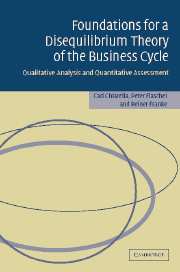 Foundations for a Disequilibrium Theory of the Business Cycle
Foundations for a Disequilibrium Theory of the Business Cycle Foreword by J. Barkley Rosser, Jr.
Published online by Cambridge University Press: 22 September 2009
Summary
The authors of this book, Carl Chiarella, Peter Flaschel and Reiner Franke, have been engaged in a major research programme in macroeconomic analysis for an extended period of time, arguably dating from the mid-1980s if not earlier. This has resulted in a series of papers and books by them and several others in various combinations, including Willi Semmler, Toichiro Asada, Gang Gong, and still more. This group is scattered in various parts of the globe, principally in the cities of Bielefeld, Beijing, New York, Sydney and Tokyo. While the output of this group is the result of visits to each other's institutions (particularly those of Flaschel to the University of Technology, Sydney) and meetings at various international conferences, the intellectual centre of their enterprise has been the Faculty of Economics at Bielefeld University. It is here that Flaschel, Franke and Semmler are, or have been at various times, located, and where the group has held an almost annual workshop on their developing research agenda over the last decade. Hence I feel it is appropriate to neologize here and dub the results of their collective efforts to constitute an emerging school of macroeconomic thought ‘the Bielefeld School’. This book can then be characterized as representing a significant phase in the development of this Bielefeld School.
The authors themselves have in earlier work provided their own label for the core model they have developed and studied: the ‘Keynes–Metzler–Goodwin’ (KMG) model.
- Type
- Chapter
- Information
- Foundations for a Disequilibrium Theory of the Business CycleQualitative Analysis and Quantitative Assessment, pp. xv - xviiiPublisher: Cambridge University PressPrint publication year: 2005


